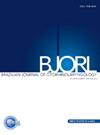Expectations Questionnaire for Adults with Cochlear Implants (EQA-CI): Translation, adaptation and cross-cultural validation to Brazilian Portuguese
IF 1.8
4区 医学
Q2 OTORHINOLARYNGOLOGY
引用次数: 0
Abstract
Objective
To translate, culturally adapt and validate the Cuestionário de Expectativas (CEA) for the Brazilian context, with focus on assessing the expectations of patients during pre-surgical stage.
Methods
An analytical and descriptive study was carried out, including translation, back-translation, adaptation and validation of the CEA. The process involved 119 participants who answered the questionnaire, allowing the analysis of understanding of the items using the Content Validity Index (CVI) and Exploratory Factor Analysis (EFA). Reliability was assessed with Cronbach's Alpha, McDonald's Omega and Composite Reliability coefficients, using Item Response Theory (IRT).
Results
The questionnaire had a total CVI of 0.974, indicating good comprehension by the participants, as well as high values for three internal consistency coefficients (⍺ = 0.828; ω = 0.854; CC = 0.900). The instrument showed great consistency indices and validity measures to be applied on a large scale.
Conclusion
The validity and reliability of the instrument were confirmed. Therefore, the instrument was translated, adapted and validated for Brazilian Portuguese.
Levels of evidence
Step 2.
人工耳蜗植入成人期望问卷(EQA-CI):巴西葡萄牙语的翻译、改编和跨文化验证
目的翻译、文化适应和验证巴西情况下的Cuestionário de Expectativas (CEA),重点评估术前患者的期望。方法对CEA进行翻译、反译、改编和验证等分析性和描述性研究。该过程涉及119名回答问卷的参与者,允许使用内容效度指数(CVI)和探索性因素分析(EFA)来分析对项目的理解。信度评估采用Cronbach's Alpha、McDonald's Omega和复合信度系数,采用项目反应理论(IRT)。结果问卷总CVI为0.974,表明被试理解程度较好,三个内部一致性系数(ω = 0.854, CC = 0.900)均较高。该仪器具有较好的一致性指标和有效性指标,适合大规模应用。结论证实了该仪器的有效性和可靠性。因此,该工具被翻译,改编和验证为巴西葡萄牙语。2.证据级别
本文章由计算机程序翻译,如有差异,请以英文原文为准。
求助全文
约1分钟内获得全文
求助全文
来源期刊

Brazilian Journal of Otorhinolaryngology
OTORHINOLARYNGOLOGY-
CiteScore
3.00
自引率
0.00%
发文量
205
审稿时长
4-8 weeks
期刊介绍:
Brazilian Journal of Otorhinolaryngology publishes original contributions in otolaryngology and the associated areas (cranio-maxillo-facial surgery and phoniatrics). The aim of this journal is the national and international divulgation of the scientific production interesting to the otolaryngology, as well as the discussion, in editorials, of subjects of scientific, academic and professional relevance.
The Brazilian Journal of Otorhinolaryngology is born from the Revista Brasileira de Otorrinolaringologia, of which it is the English version, created and indexed by MEDLINE in 2005. It is the official scientific publication of the Brazilian Association of Otolaryngology and Cervicofacial Surgery. Its abbreviated title is Braz J Otorhinolaryngol., which should be used in bibliographies, footnotes and bibliographical references and strips.
 求助内容:
求助内容: 应助结果提醒方式:
应助结果提醒方式:


